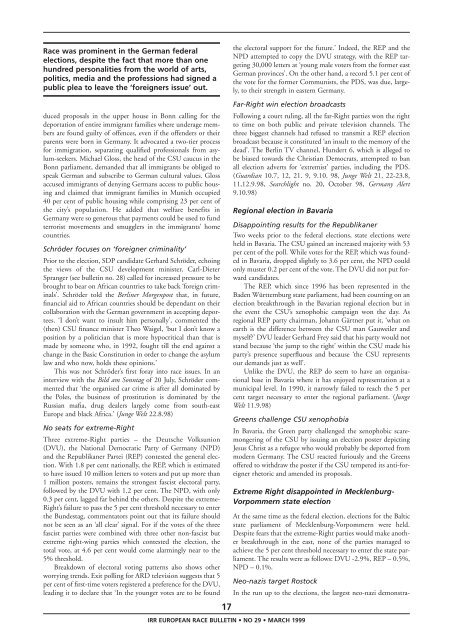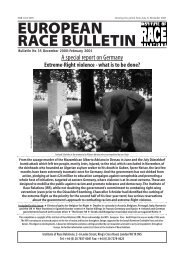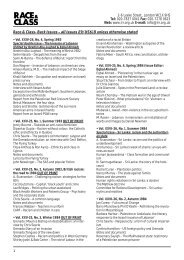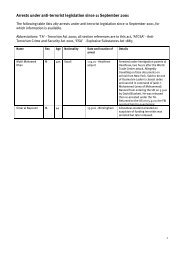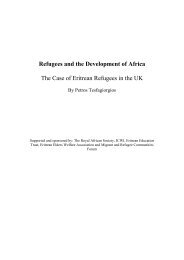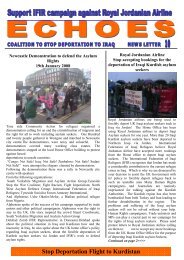EUROPEAN RACE BULLETIN - Institute of Race Relations
EUROPEAN RACE BULLETIN - Institute of Race Relations
EUROPEAN RACE BULLETIN - Institute of Race Relations
Create successful ePaper yourself
Turn your PDF publications into a flip-book with our unique Google optimized e-Paper software.
<strong>Race</strong> was prominent in the German federalelections, despite the fact that more than onehundred personalities from the world <strong>of</strong> arts,politics, media and the pr<strong>of</strong>essions had signed apublic plea to leave the ‘foreigners issue’ out.the electoral support for the future.’ Indeed, the REP and theNPD attempted to copy the DVU strategy, with the REP targeting30,000 letters at ‘young male voters from the former eastGerman provinces’. On the other hand, a record 5.1 per cent <strong>of</strong>the vote for the former Communists, the PDS, was due, largely,to their strength in eastern Germany.duced proposals in the upper house in Bonn calling for thedeportation <strong>of</strong> entire immigrant families where underage membersare found guilty <strong>of</strong> <strong>of</strong>fences, even if the <strong>of</strong>fenders or theirparents were born in Germany. It advocated a two-tier processfor immigration, separating qualified pr<strong>of</strong>essionals from asylum-seekers.Michael Gloss, the head <strong>of</strong> the CSU caucus in theBonn parliament, demanded that all immigrants be obliged tospeak German and subscribe to German cultural values. Glossaccused immigrants <strong>of</strong> denying Germans access to public housingand claimed that immigrant families in Munich occupied40 per cent <strong>of</strong> public housing while comprising 23 per cent <strong>of</strong>the city’s population. He added that welfare benefits inGermany were so generous that payments could be used to fundterrorist movements and smugglers in the immigrants’ homecountries.Schröder focuses on ‘foreigner criminality’Prior to the election, SDP candidate Gerhard Schröder, echoingthe views <strong>of</strong> the CSU development minister, Carl-DieterSpranger (see bulletin no. 28) called for increased pressure to bebrought to bear on African countries to take back ‘foreign criminals’.Schröder told the Berliner Morgenpost that, in future,financial aid to African countries should be dependant on theircollaboration with the German government in accepting deportees.‘I don’t want to insult him personally’, commented the(then) CSU finance minister Theo Waigel, ‘but I don’t know aposition by a politician that is more hypocritical than that ismade by someone who, in 1992, fought till the end against achange in the Basic Constitution in order to change the asylumlaw and who now, holds these opinions.’This was not Schröder’s first foray into race issues. In aninterview with the Bild am Sonntag <strong>of</strong> 20 July, Schröder commentedthat ‘the organised car crime is after all dominated bythe Poles, the business <strong>of</strong> prostitution is dominated by theRussian mafia, drug dealers largely come from south-eastEurope and black Africa.’ (Junge Welt 22.8.98)No seats for extreme-RightThree extreme-Right parties – the Deutsche Volksunion(DVU), the National Democratic Party <strong>of</strong> Germany (NPD)and the Republikaner Partei (REP) contested the general election.With 1.8 per cent nationally, the REP, which is estimatedto have issued 10 million letters to voters and put up more than1 million posters, remains the strongest fascist electoral party,followed by the DVU with 1.2 per cent. The NPD, with only0.3 per cent, lagged far behind the others. Despite the extreme-Right’s failure to pass the 5 per cent threshold necessary to enterthe Bundestag, commentators point out that its failure shouldnot be seen as an ‘all clear’ signal. For if the votes <strong>of</strong> the threefascist parties were combined with three other non-fascist butextreme right-wing parties which contested the election, thetotal vote, at 4.6 per cent would come alarmingly near to the5% threshold.Breakdown <strong>of</strong> electoral voting patterns also shows otherworrying trends. Exit polling for ARD television suggests that 5per cent <strong>of</strong> first-time voters registered a preference for the DVU,leading it to declare that ‘In the younger votes are to be found17Far-Right win election broadcastsIRR <strong>EUROPEAN</strong> <strong>RACE</strong> <strong>BULLETIN</strong> • NO 29 • MARCH 1999Following a court ruling, all the far-Right parties won the rightto time on both public and private television channels. Thethree biggest channels had refused to transmit a REP electionbroadcast because it constituted ‘an insult to the memory <strong>of</strong> thedead’. The Berlin TV channel, Hundert 6, which is alleged tobe biased towards the Christian Democrats, attempted to banall election adverts for ‘extremist’ parties, including the PDS.(Guardian 10.7, 12, 21. 9, 9.10. 98, Junge Welt 21, 22-23.8,11,12.9.98, Searchlight no. 20, October 98, Germany Alert9.10.98)Regional election in BavariaDisappointing results for the RepublikanerTwo weeks prior to the federal elections, state elections wereheld in Bavaria. The CSU gained an increased majority with 53per cent <strong>of</strong> the poll. While votes for the REP, which was foundedin Bavaria, dropped slightly to 3.6 per cent, the NPD couldonly muster 0.2 per cent <strong>of</strong> the vote. The DVU did not put forwardcandidates.The REP, which since 1996 has been represented in theBaden Württemburg state parliament, had been counting on anelection breakthrough in the Bavarian regional election but inthe event the CSU’s xenophobic campaign won the day. Asregional REP party chairman, Johann Gärtner put it, ‘what onearth is the difference between the CSU man Gauweiler andmyself?’ DVU leader Gerhard Frey said that his party would notstand because ‘the jump to the right’ within the CSU made hisparty’s presence superfluous and because ‘the CSU representsour demands just as well’.Unlike the DVU, the REP do seem to have an organisationalbase in Bavaria where it has enjoyed representation at amunicipal level. In 1990, it narrowly failed to reach the 5 percent target necessary to enter the regional parliament. (JungeWelt 11.9.98)Greens challenge CSU xenophobiaIn Bavaria, the Green party challenged the xenophobic scaremongering<strong>of</strong> the CSU by issuing an election poster depictingJesus Christ as a refugee who would probably be deported frommodern Germany. The CSU reacted furiously and the Greens<strong>of</strong>fered to withdraw the poster if the CSU tempered its anti-foreignerrhetoric and amended its proposals.Extreme Right disappointed in Mecklenburg-Vorpommern state electionAt the same time as the federal election, elections for the Balticstate parliament <strong>of</strong> Mecklenburg-Vorpommern were held.Despite fears that the extreme-Right parties would make anotherbreakthrough in the east, none <strong>of</strong> the parties managed toachieve the 5 per cent threshold necessary to enter the state parliament.The results were as follows: DVU -2.9%, REP – 0.5%,NPD – 0.1%.Neo-nazis target RostockIn the run up to the elections, the largest neo-nazi demonstra-


